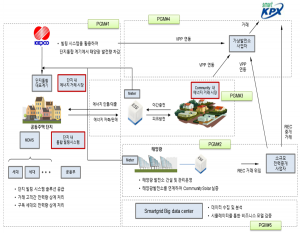A office worker living in Seoul runs washing machines and vacuum cleaners mainly in the evening after work. After the creation of a'selective rate plan' that allows you to choose electricity rates according to your life pattern, like mobile phone rates, you are using a cheaper rate plan during the late night, reducing the burden on electricity bills than before. The apartment complex where Mr. A lives is also in operation, a kind of'small power plant' that integrates and manages and uses the electricity produced by the solar power installed on the common site and the mini solar power on the veranda of each household. The solar electricity produced in our apartment complex is shared by the residents of the complex and the remaining electricity is sold to increase profits.
□ This landscape soon becomes everyday in Seoul. Seoul will build a demonstration complex that realizes 'Smart Grid', which emerged as a core service in the era of the 4 Industrial Revolution.
□ 'Smart Grid' is a word that combines 'Smart' which means 'Smart' and 'Grid' which means 'Power Grid' (distribution network for supply such as electricity). It is called 'Intelligent Power Grid'. By applying ICT technologies such as AI (artificial intelligence) and IoT (Internet of Things) to the power grid, the electricity consumption and supply information is collected in real time, and this information is exchanged between power producers and consumers. With real-time visibility into electricity usage, power producers can efficiently control their power generation, while consumers can use electricity to avoid relatively expensive periods.
□ The core of Seoul's newly established Smart Grid Demonstration Complex is the 'smart energy community', where residents consume new and renewable energy directly and wisely.
□ First of all, we will introduce 'Selective Electric Plan' through big data analysis considering various life patterns. You can choose from a variety of electricity plans, depending on your household's power consumption style, such as cell phone rates.
□ Integrate and manage all new and renewable energy produced in the demonstration complex as a power plant and introduce new services shared by the residents. In the meantime, the power generated by the solar power in each household can be consumed only by each household, so if there is any remaining power, it will just disappear. In the future, the electricity remaining in our house can be shared with the next door.
○ When the renewable energy sharing method is introduced, integrated power management of distributed power sources such as solar energy installed in the public land as well as home solar energy can be managed in one place, and the remaining electricity can be sold to power markets such as KEPCO. It may be.
□ The city of Seoul will begin demonstrating the'Smart Energy Community' for 19.7 years ('4.~'19.) starting with Seodaemun-gu, which was selected as the'Seoul Energy Independent Innovation District' ('23.). The demonstration complex to be built in Seodaemun-gu will have 2,000 apartments and 1,000 households, including low-rise housing, shopping malls, and buildings. The city plans to analyze the results of the demonstration project and expand it to the whole of Seoul in the future.
○'Energy Independence Innovation Zone' is the content of expanding the scope of the energy conservation, efficiency, and production projects of energy self-reliance villages, which the city has been promoting at the unit of small-scale village communities, to the autonomous district unit, and to establish a regional energy conversion data platform. The key point is to develop a leading energy conversion model such as strengthening energy demand management and discovering profitable businesses through organic cooperation between residents, companies, cities and autonomous regions using the platform.
○ Following the creation of 18 energy self-sufficient villages by 100, the city of Seoul promoted an energy self-sufficient innovation district as the 2nd stage (2.0) project of the energy self-sufficient village.
<Ministry of Trade, Industry and Energy national project final selection... 4Year 187100 million won, Regulate Sandbox>
□ In relation to this, Seoul announced that it was selected as a project target along with the Omni System Consortium (12 industry-university research institute) at the "Future Smart Grid Empirical Research" organized by Ministry of Trade, Industry and Energy.
○ Specific plans for 5 sectors, such as the optional system of the omni system consortium, are specifically designed, especially active participation of citizens in energy issues such as Seoul's energy independence village and eco mileage, and policy support to foster energy prosumers. The high will was appreciated.
□ A total of 4 billion won (National 187 billion won, privately funded 127 billion won) will be supported for 60 year. In addition, new services and business models, which could not be applied due to legal and institutional constraints, can be demonstrated by applying 'regulated sandbox'.
■ Sandbox : In order to prevent new converged products and services from being released into the market due to regulations, the main contents are “fast confirmation of regulation, ② special regulation for demonstration, ③ temporary permission” under the Industrial Convergence Promotion Act.
□ The city aims to lead the 'energy sharing economy era' in which citizens take the lead in consumption, production, and trading services as the main actors in energy demand management through the smart grid demonstration project. In addition, the city plans to secure the driving force by incorporating this demonstration project into the 'Energy-Independent Innovation District,' a new model of participatory energy conversion.
※ Energy sharing economy: A market economy where 'energy consumers' and 'energy suppliers' with energy idle assets trade energy services using idle assets through 'ICT platform brokerage'.
The head of Climate and Environment Division, Seoul, said, “Based on the foundation of the city of solar power, reducing the number of nuclear power plants, Seoul can now open the era of energy prosumer in earnest.” We will lead the energy sharing economy using the core technologies of the tea industry revolution and do our best to respond to the climate crisis. ”

[Energy citizen cooperation section] 2133-3588



